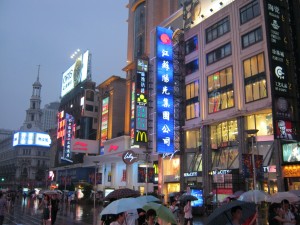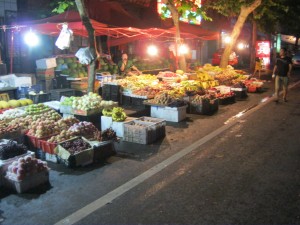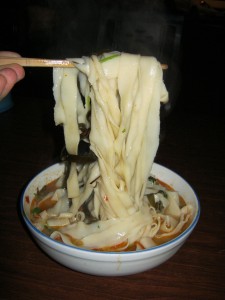I have just got back from my trip to China. My purpose in going was mainly for my kung fu and qigong teaching, to check out the schools there, gain ideas and inspiration, and prepare for when groups from my school may make trips there. But I also found that I had a lot of experiences and saw a lot of things that gave me food for thought about the ‘give freely receive freely’ concept.
One thing that was particularly relevant was that in China there is no fixed price on almost anything. Almost everything is negotiable and the locals expect there to be some haggling before a final price is established at which an exchange will take place. At one of the major markets the vendors will typically ask in the region of 10 times what they will actually accept for what they are selling. Then a drawn out negotiation begins during which they will act like whatever price you suggest is ridiculous, tell you how other people they would normally quote a higher price for but for you they quoted a reasonable price, they will try and show you inferior products and suggest that maybe you could buy one of them instead, they will suggest a price not much lower than they initially offered, you walk away and then they call after you with a better price, they may act sad, angry etc and then eventually you come to a price you a both happy with.
The process can be entertaining I suppose, but also takes quite a bit of time. On the two occasions when I tried to shorten the process and get to a price I was happy with faster (and KNEW I could get from experience with other stallholders), they wouldn’t sell to me. It seems like in order to get a reasonable price I HAD to go through the charade, even though getting to a price we both new was reasonable faster would have saved both of us a lot of time and energy. After awhile I began to avoid the markets because I didn’t want to put so much time and effort into a simple transaction, although I suppose I would still go there if there was something I really needed.
But it doesn’t stop there, even in the big flash department stores with marked prices on everything, apparently things are still negotiable. It became very difficult to know what price to really expect for things.
The one exception was food. I had a long conversation about this with a Chinese lady who made sure to let me know that I should negotiate on absolutely EVERYTHING in China with the only exception being food, for food the price was the price. She probably wasn’t aware that there was a slight proviso to that, the price is the price as long as you are CHINESE. Probably 90% of the time or more I think the people selling me food just charged me the same price as they would anyone else, but there were a couple of occasions at fruit shops where I was charged far more than I should have been. At one of these I know I was charged 10 times the price of a local, because I saw what a local was charged for the same items. I could have entered into negotiations at this point to get a better price, but was quite bemused by the whole thing at the time so just paid the money and left. But while I may have had more money than some of the locals, I certainly did not have enough that I would have been able to afford that price for food on a regular basis, so if I had been staying in the area I never would have bought from that shop again.
So how does this all tie in to the ‘give freely, receive freely’ concept? Well for a start in many ways I liked there not being a fixed price, it provided a mechanism by which those with more could pay more and those with less could pay less. A lot of the time I am sure that even with some hard bargaining I still paid considerably more than a local would, and I don’t mind that, because it was a price I could afford and was happy with. The bargaining to reach a price though became tedious and time consuming. So much energy was put into the transaction by both sides to make sure they got as much (or gave as little) as possible in the deal. Surely we all would be better off if this energy was put into other productive things. With give freely receive freely, no energy is expended on negotiation, meaning we all have more time and energy for the things we really want and need in life.
It is very hard for us to know the circumstances of everyone we deal with. Sometimes the initial price quoted by a vendor would be so high it seemed ridiculous even to a westerner used to paying more in their home country. They really seemed to have little conception of what would seem like a reasonable price to us. On the other hand, for a foreigner it was very hard to tell where the true local price point was, because many things were so cheap that you could pay two or three times what a local would and still feel like you got a pretty good price. Using a give freely receive freely approach means that we do not judge the circumstances of another but let them give according to what they can. I wonder how some of the stall holders might have fared under such a system. I know there were times when I would have gladly paid more for something, but the whole mindset of bargaining sets you up to try and get as low a price as you possibly can (or have the time and patience to bargain for).
I also respected the fact that for food at least the price was usually the price. I think there is a basic human understanding that there are certain things we need to survive so at least for those things we should deal fairly with each other. While it was possible to pay a lot for food in China, there seemed to always be very cheap options as well, even in the big cities, that I think even the poor would have been able to afford. For the most part I think I was treated decently by the people selling food in China, and I appreciated that. Maybe the exceptions with the fruit could be due to fruit being viewed as a luxury? I’m not sure about that.
When we deal unfairly with someone in our community, it may make us a short term profit, but ultimately in the long run do us harm. In the case of the fruit stands that charged excessively for what I bought from them, they would have really lost out if I had stayed in the area. I eat quite a lot of fruit, but having been ripped of once, I would not go back to that shop, I would find somewhere that charged me fairly and they would get all my business. I am sure this also has wider implications that will affect those involved even if they manage to only overcharge those who would not be returning to their shop anyway. The world is all interconnected and our actions tend to have ripple effects. Others would observe how the shop owner treated foreigners, and this in turn would shape their view of the shop owner and how they interact with them, I’m sure in the end there would be some effect even if not immediately – a bit like the concept of karma.
So all up China was an interesting and thought provoking experience. There were many other things I saw or experienced while I was there that have a bearing on ‘give freely, receive freely’ too, but I think I will write about those more when I get to writing about various specific topics.






I came across an almost identical bargaining ‘system’ in Thailand and the entire process became so tiresome, it was a disincentive to buy anything at all. The dual price phenomenon was so blatant, that there were even signs indicative one price for locals and another price for foreigners at some markets and even train stations.
I can definitely relate to any frustration you might have felt after a while.
Interesting read, John. Would love to see more photos from your trip :)!
Thanks Anya, maybe you’ll be able to make it along to the photo evening and dinner on the 3rd of August.